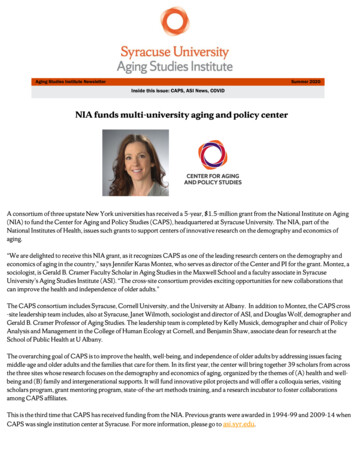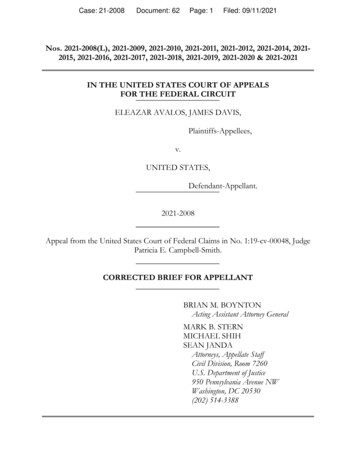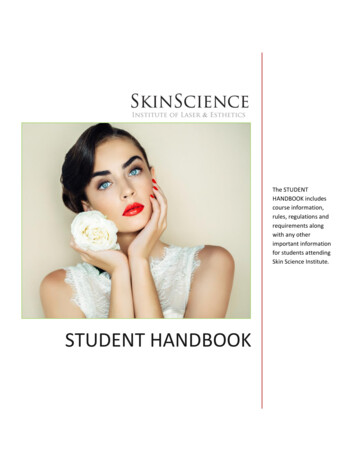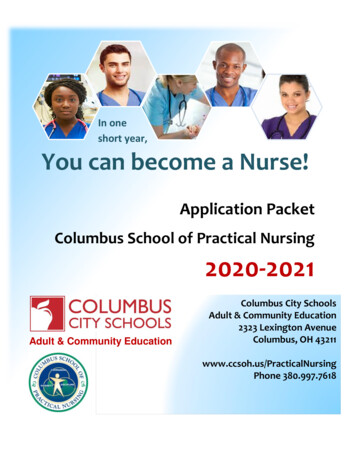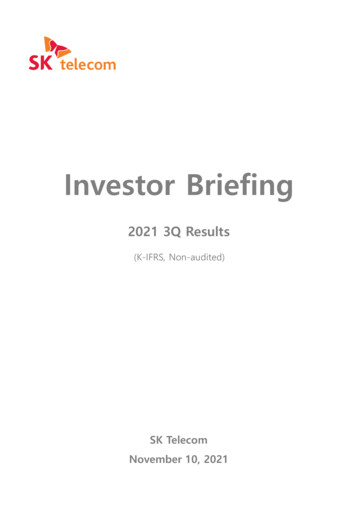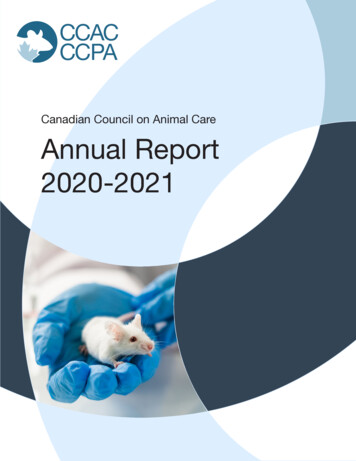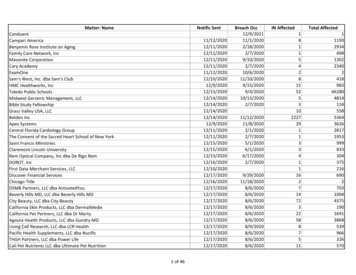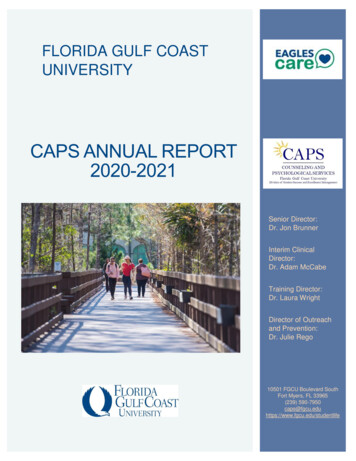
Transcription
FLORIDA GULF COASTUNIVERSITYCAPS ANNUAL REPORT2020-2021Senior Director:Dr. Jon BrunnerInterim ClinicalDirector:Dr. Adam McCabeTraining Director:Dr. Laura WrightDirector of Outreachand Prevention:Dr. Julie Rego10501 FGCU Boulevard SouthFort Myers, FL 33965(239) ife/healthandsafety/caps/
Message from CAPS Senior DirectorDr. Jon BrunnerWelcome to the FGCU Counseling and Psychological Services (CAPS) annual report!The past year’s challenges of racial and social justice and the pandemic were significant for us all.Despite these challenges we persevered and continued to provide services to the best of our ability.When the pandemic hit, impacting our service delivery, we pivoted to online services in a matter ofthree days! We anticipate that such a format will continue to be a major component of our servicedelivery. We look forward to the challenge of a “new normal”.Despite less students on campus and fewer attending classes in person, we provided direct contactservices to over 12% of FGCU students and had over 300 consultations with faculty and staffregrading student issues and the psychological well-being of the FGCU community.We hope you find this report informative and helpful as we continue to develop services for FGCUstudents and the FGCU campus. We strive to constantly evolve in our status as a ComprehensiveCounseling Center (CCC); providing direct clinical services, outreach and prevention programs,training opportunities for developing professionals in the field and connecting with all our communityconstituents through consultation and collaboration (the four pillars of a CCC). Please join us andshare your feedback and suggestions in our efforts to grow and improve as we all work togetherfor the success of FGCU students. Go Eagles!
IntroductionThis report covers CAPS operation during the 2020-2021 fiscal year (FY), which ran from July 1stthrough June 30th. The 2019-20 FY was unique in many ways for CAPS, the FGCU community, thenation, and the world. This reality continued through the 2020-21 FY. CAPS was faced with awonderful series of opportunities and challenges during this time. Challenges that we faced headon through ingenuity, flexibility and teamwork.The events that highlighted the 2020-21 FY provide an undercurrent for the graphs, data, andsummaries found below. While the impact of the pandemic resulted in a visible downturn in thenumber of clients served, the persistence and resiliency of CAPS staff cannot be captured innumbers or visuals. While last year we learned on our feet to provide services remotely, we utilizedthe 2020-21 FY to evolve and, in some ways, excel at providing quality services to our students andcampus partners.CAPS serves the entire University community in many ways. While, only individuals enrolled asstudents at FGCU are eligible for direct clinical services (e.g., psychotherapy, psychiatry), CAPSprovides consultation, outreach, training, and other services for FGCU students, faculty, staff andthe entire SWFL community. Putting time and energy into all four pillars of University CounselingCenter work, CAPS strives to bring warmth, creativity, knowledge, and inspiration for positive growthto all those we serve.As the pages below will detail, CAPS directly served almost 1700 FGCU students in a variety ofways. We also provided support, information, and mental health education and guidance tonumerous staff, faculty, community members, and other students who were not CAPS clients. Wework hard to fulfill each pillar of a comprehensive counseling center with a sense of professionalism,creativity, and connection. We consistently aim to grow as a center and improve both the serviceswe offer our students and the way we engage the entire FGCU and SWFL community. If you haveany questions or feedback about this report or CAPS services, please contact CAPS’ Interim ClinicalDirector at amccabe@fgcu.edu.
CAPS ClientsGender IdentitySelf-identify2%No response6%Transgender1%Male25%Female66%No ace/EthnicityAmerican Indianor Alaskan 1%AsianAmerican/Asian2%Hispanic/Latino16%Native Hawaiianor PacificIslander 1%Multi-racial5%White59%
Client DemographicsNon-degree 1%Graduate6%Year in SchoolOther 1%No response 1%High-school/dual-enroll 1%No response14%Sexual al12%Junior30%Sophomore20%No response 1%Self-identify9%International Student?Yes2%Gay3%Heterosexual57%Lesbian2%Transfer Students27%Live on Campus43%Registered DisabilityNo98%10%Active/Past Military1%0%10%20%30%40%50%
Presenting ConcernsStudents come to CAPS to address a variety of concerns, although the top reasons have been consistent for many years. Below are thetop 5 concerns that students indicate they would like to address and that clinicians note as creating distress for the client. The percentageof clients who struggled with each issue during the 2020-2021 year can be found in the boxes describing to each issue.The order in which students endorse these concerns have gone virtually unchanged over the past 5 years, although the percentage ofCAPS clients endorsing these concerns has increased almost every year. A brief discussion of these presenting concerns and ways inwhich these concerns impact CAPS clients is included in the text boxes.#1: Anxiety and StressAnxiety and Stress#2: Depression#3: Relationship ConcernsEndorsed by 70% and 61% of students,respectively.#4: Academic ConcernsAnxiety and stress can be difficult to teaseapart and there can be nuanced reasonssomeone might indicate their presentingconcern as anxiety rather than stress, orvice versa. Thus, we have grouped thesetwo categories together in this report.#5: Self-Esteem/ConfidenceFor students, anxiety can lead toavoidance, panic attacks, and a high levelof distress both socially and academically ifleft unmanaged.Relationship ConcernsEndorsed by 42% of students this year.Relationship concerns include friendships,family and romantic relationships, andgeneral social functioning.Relationship struggles, when long-standing,can lead to interpersonal patterns that caninterfere in many aspects of a student’s life.DepressionEndorsed by 56% of students this year.A generation or two ago, depressionwas consistently endorsed as the #1presenting concern, however thatchanged in the early 2010’s.Depressioncancreatedifficultymaintaining energy, motivation, andconcentration. Students who strugglewith depression often see their grades,social life, and daily functioningdeteriorate.Some students have been dealing withdepression since childhood.
Presenting Concerns (cont.)Academic DistressSelf-esteem/ConfidenceEndorsed by 31% of CAPS clients this year.Endorsed by 30% of CAPS clients this year.Academic distress can be a contributor toand a symptom of other concerns. Forexample, anxiety can lead to academicdistress, or academic distress can contributeto anxiety.Low self-esteem/confidence is not uncommonfor young people to experience. When itinterferes with one’s life to the point that theyare not functioning well, this can promptpeople to seek professional support to try andimprove their self-esteem/confidence.Ongoing academic distress can lead toavoidance or, in some cases, dropping out ofcollege.Low self-esteem/confidence can sometimesdevelop through early childhood experiences,incidents of trauma, and sometimes withoutany apparent ‘triggers’. Regardless, low selfesteem/confidence can lead to poorperformance,socialand/oracademicavoidance, and low mood.Sometimes academic distress stems fromunderlying learning disorders or other issues.In addition, many students at FGCU work tosupport themselves or their families andstruggle to balance these demands, whichcan lead to academic distress.Trauma – 28%Sleep – 25%Social Isolation – 20%Emotional Dysregulation – 18%Grief/Loss – 12%Adjustment to new environment – 10%Eating/Body Image– 20%Attention/Concentration – 12%Suicidality – 10%(This does not represent an exhaustive list, only those concerns with a 10% or more endorsement rate)
ClinicalServiceTraining andSupervisionOutreach andPreventionConsultation andCollaborationCAPS at FGCU is structured based on the 4 pillars of college counseling. This includes the 4 main areas you see above, Clinical Service,Training and Supervision, Outreach and Prevention, and Consultation and Collaboration. Each of the areas will be described below anda section of this report will present a brief year in review for CAPS.Clinical ServiceTraining andSupervisionOutreach and PreventionOutreach is an integral aspect ofClinical Service at CAPSour operation. While outreach inencompasses group and individual CAPS maintains ancollege counseling historicallytherapy, psychiatry, dietaryAPA accreditedfocused on informing students ofcounseling, case management,doctoral internship asthe existence of counselingtesting and assessment and crisis well as a long-standingservices and soliciting clientele, dueintervention. Each student whomaster’s level trainingtothe high demand for our services,wishes to become a client at CAPS program. We host 3we have shifted our focus toparticipates in an initial contactDoctoral Interns and asreaching marginalized groups andappointment so a counselor canmany as 5 Master’staking psychoeducation and skillsassess the student’s needs andLevel Trainees eachtraining outside of the counselingmake treatment recommendations year.center walls.as appropriate.Consultation andCollaborationCAPS is available to consultwith faculty, staff, and studentson any issue/questions relatedto mental health. We activelymaintain liaison relationshipswith 17 different departmentsacross campus and frequentlycollaborate with otherdepartments that are part of theDivision of Student Success andEnrollment Management.
Clinical ServicesClients and 82000159510000150080006000110101210513375 12616107761161810004000500200000Total Appointments AttendedUnique ClientsAs we began to see last year at the beginning of thecoronavirus pandemic, there was a bit of a down turnin students seeking services.This continuedthroughout the 2020-21 academic year. Although weremained fairly busy, our numbers were not quite assignificant as we have seen during previous years. Aswe come out the other side of this pandemic, as we“return to normal,” it remains to be seen how demandmay change going forward.We conduct a student satisfaction survey each yearand, while we are proud of the positive results, we willcontinue to look for ways to reach more students andimprove our services and interactions with clients,students, and any other individuals and offices withwhich we come into contact. As opposed to previousyears when the survey was given to clients while theywere in the office, now the survey is sent to any studentwho attended one or more appointments during thepreceding 6-week period. This method increases theresponse rate and also access to students who maynot have returned for follow-up appointments. Thus,we are able to collect a more representative sample ofstudent perspectives and experiences.More than 80% of CAPS clients attended 10 or fewerappointments during the yearStudent Satisfaction Survey Results*2018-2019I felt comfortable at CAPS and would return.89%I would recommend CAPS to others.89%My clinician really understood me.88%Improved my understanding of self and others.75%Positive effect on overall campus experience.76%Better able to manage difficulties.72%Wait time was reasonable.76%Better able to focus on academics.62%Made it possible for me to continue as a student.56%2019-202090%90%89%77%77%78%85%61%61%* Comparisons with other previous years are not provided because we changed survey collection procedures in 2018, whichgreatly increased both the range clients who completed the survey and the return rate.2020-202179%81%80%72%70%66%79%58%59%
Group TherapyCAPS began expanding group therapy options in 2010 and during the 2020-2021 academic year offered20 different group opportunities during the Fall and Spring semesters. Most groups do not run duringthe summer semesters due to lower enrollment and poor/sporadic attendance.Group 01000 2020-2021 Group OfferingsBack to Life Relationship GroupBold Eagles, Men of Character Pop Up WorkshopsCome As You Are (Addiction group) Stepping StonesCreative Self-Exploration Survivor HealingDialectical Behavior Therapy skills Trauma Recovery and EmpowermentEmotional Wellness Experience (TREE)Grief Group Translucence (Trans* Support)Mindfulness Meditation Understanding Self and Others (USO)Nourish: Body and Self Women2WomenRainbow Eagles (LGBT support) Women Who Run With WolvesGroup therapy is often considered the most effective and efficient mode of treatment for some clientsand some mental health issues. We have worked hard to increase the number of students who haveaccess to our groups. Since 2014, we have increased the number of students who have participated ingroups at CAPS from 240 to near 500 in 2019-20. We have, however, experienced a decline over thepast year, likely reflective of our overall drop in numbers due to the pandemic. Nevertheless, we continueto see more clients who are able to access treatment for their specific concerns while having theopportunity to learn from each other and connect on a deeper level with their peers. Continuing to offerskills groups aimed at helping students navigate the three most common presenting concerns has beenparticularly helpful over the 2020-21 FY.Number of Group Clients490500“They won’t solve your problems, butthey will help you learn the tools youneed to solve your own problems” CAPS Group participant400300200100351397310315
PsychiatryAt FGCU, we are fortunate to have a full-time psychiatrist housed within CAPS to provide psychiatricsupport to students who might need medication. CAPS’ psychiatrist takes a collaborative approach toworking with students. In addition to working collaboratively with his clients to identify goals, medicationpreferences, etc., he actively consults with the individual therapists working with his clients and, whenappropriate, with parents or supportive family members. This year, CAPS Psychiatry served over 400and attended over 1300 appointments.11% of CAPS clients report that they have been prescribed medicationfor a mental health issue prior to coming to college.Over the past year, the CAPS’ psychiatrist was able to continue implementing the Firstline OptimalCognitive Utility Strategies (F.O.C.U.S.) program. This tool has allowed CAPS to streamline oursupport for students who have struggled with attention and concentration by providing them educationand skills to explore prior to medication options.Dietary ServicesTesting ServicesIn the past, CAPS has been able to offer a part-timeLicensed dietician. However, over most of the pastyear, this position has not been filled. When thedietician was still at our center, they primarily workedwith students to provide general nutritional guidance,encourage the development of healthy eating patterns,assess for eating disorders, and provide support fortherapists working with clients who exhibit patterns ofdisordered eating. We look forward to the future as wehave recently hired someone new to the position who isexcited to be a support for our students!Dietician Appointments350300250200150100500325147103126CAPS offers psychoeducational testing services for studentswho might need to determine if they meet criteria for a learningdisorder or ADHD. CAPS produces in-depth and thoroughtesting reports for every student tested. Students who meetcriteria for a learning disorder or ADHD are eligible foracademic accommodations, set up through the Office ofAdaptive Services.CAPS has generally maintained a steady number of testsadministered over the past several years, with the exceptionof 2017-18, when we were able to test additional students whowould have otherwise not been able to afford testing due toone-time state monies with which we were able to offer testingscholarships. Note the recent decrease in testing over thepast year was due to COVID restrictions and our limited abilityto conduct testing while respecting health guidelines (i.e.social distancing, etc.).Testing Consultations798060402003759413934
Outreach and PreventionOutreach and Prevention efforts have long been an important part of CAPS mission. Duringthe 2020-2021 year, CAPS participated in 160 outreach events, which included almost 5300people. These events included tabling events to share information, resources, or activitieswith students, faculty, and staff, presentations on specific mental-health related topics,presence at events that were anticipated to potentially lead to distress for some individuals,and large, campus- or community-wide events hosted or sponsored by CAPS. You will noticethat the decline of outreach opportunities was also related to pandemic restrictions and theoverall decrease of outreach events.CAPS hosts two large campus or community-wide events each year. Although thecoronavirus continued to act as a barrier, through creativity and flexibility, we were able torun these events, albeit, in different forms.Fresh Check Day is a fun and engaging event with tables and activities that focus on raisingawareness about various aspects of mental health. CAPS partners with many FGCUdepartments in bringing Fresh Check Day to our students. This year, through campus-widecoordination, we were able to host this event in-person while respecting healthy guidelinesas proposed by the CDC including proper social distancing, mask wearing etiquette and otherimportant health behaviors. Although the number of students reached this year was short oflast year’s 400 mark, we were still able to engage approximately 100 students on campus.Our other event, the Out of the Darkness walk, is an event that focuses on suicideprevention and brings groups of walkers from both campus and the SWFL community. Thisevent features a 5K walk/run, a speaker, healthy snacks and musical entertainment. CAPSpartners with the American Foundation for Suicide Prevention to host this event.In light of COVID guidelines, we hosted this event as a virtual walk, and as such, was unableto keep track of engagement. As we move into the fall of 2021 with a hope of finding somenormalcy, we would like to bring the Out of Darkness walk back to the SWFL community!
TrainingThe CAPS training program is another important pillar in our counselingcenter. The training program consists of 4 levels. We accept Master’sstudents from FGCU’s Clinical Mental Health Counseling program as ourMaster’s Level Trainees (MLT’s). They typically work at CAPS 2-3 days aweek to provide individual and group sessions as well as outreach to thecampus community. We typically have at least 3 MLT’s at any one time.The next level of trainee is our Doctoral Practicum students. This year wewere fortunate to have one practicum student that joined us at CAPS. Thisindividual joined us two days a week to acquire clinical experience and toprovide individual and group therapy, outreach to the campus community, andoften consultation to faculty and parents. We have been fortunate for the lastseveral years to have at least one doc prac student each year.Our Doctoral Psychology Interns are students that come from APA accreditedpsychology doctoral programs across the country. Our Doctoral Internship isalso APA accredited and follows strict guidelines and principles of operation.These students go through a match process where they interview and rankinternships and internships interview and rank the students. We have 3 ofthese spots annually and the match process happens in November-Februaryof the previous academic year for the fall interns. They provide all of the sameservices that our licensed psychologists provide under intensive supervisionand frequent evaluation.In the past we have also had a post-doc psychologist position however onceagain this position was not funded in the past year.This year’s trainees attended almost 2300 appointments,serving more than 500 unique clients. They also gave 17presentations to students or other campus partners.
Consultation and CollaborationIn addition, CAPS consults with campus and community partners, students, parents, faculty, and staff about various questions andconcerns related to mental health. Consultations typically center around concerns about a student’s mental health and how to bestsupport the student.Consultation Appointments 2020-2021Consult- community/advocacy/third partyConsult - faculty/staffConsult parentConsult - student (non-clinical)050100150200250300350CAPS maintains liaison relationships with numerous departments across campus. We also work hard to establish and maintainrelationships with community partners. During the 2020-2021 year, CAPS established or maintained relationships with numerous campuspartners, including:Advising (Centralized and Exploratory)Adaptive ServicesAthleticsBehavioral Consultation and AssessmentCampus RecreationDean of Students/Student Care ServicesCareer Development ServicesCenter for Academic AchievementFaculty SenateHousing and Residence LifeInternational ServicesMulticultural Leadership and DevelopmentPrevention and WellnessStudent ConductStudent Health ServicesStudent Support Services (TRIO)University Police DepartmentUnited Campus Ministries
CAPS StaffCAPS maintains a dynamic staff that represent a number of different mental health disciplines, levelsof experience, and areas of specialty.Client Services StaffNeenah FornosMaria KoenigHolly MathewsCarolyn PelotteLicensed Mental Health CounselorsBrian Bakalar (Case Manager)Melanie Fisher (pre-license)Ivette GomezJody MagrasJessica MatthewsAlex McAllisterWendy PowellJulie RegoRebecca SherryCassandra Sirmans (pre-license)PsychiatristJoshua HershPsychologistsJon BrunnerKatherine CascioDennis ChristoffersenJeannette CorredorMichael GhaliAdam McCabeCatherine Tallant (pre-license)Rebecca WiemerslageLaura WrightSpecialty PositionsJulie Cole – DietitianBeth Martin – Testing SpecialistTraineesMichael Baglieri – Doctoral InternVictoria Blair– Registered InternLaura Bonnemort – Doctoral InternStephan Hauptfleisch – Doctoral InternDan Krizan– Doctoral Practicum StudentSarah McKee - MLTSarah Pabon – Doctoral InternAlexis Sylvia – MLTAmanda Zoghbi – MLT
master's level training program. We host 3 Doctoral Interns and as many as 5 Master's Level Trainees each year. Outreach and Prevention Outreach is an integral aspect of our operation. While outreach in college counseling historically focused on informing students of the existence of counseling services and soliciting clientele, due

